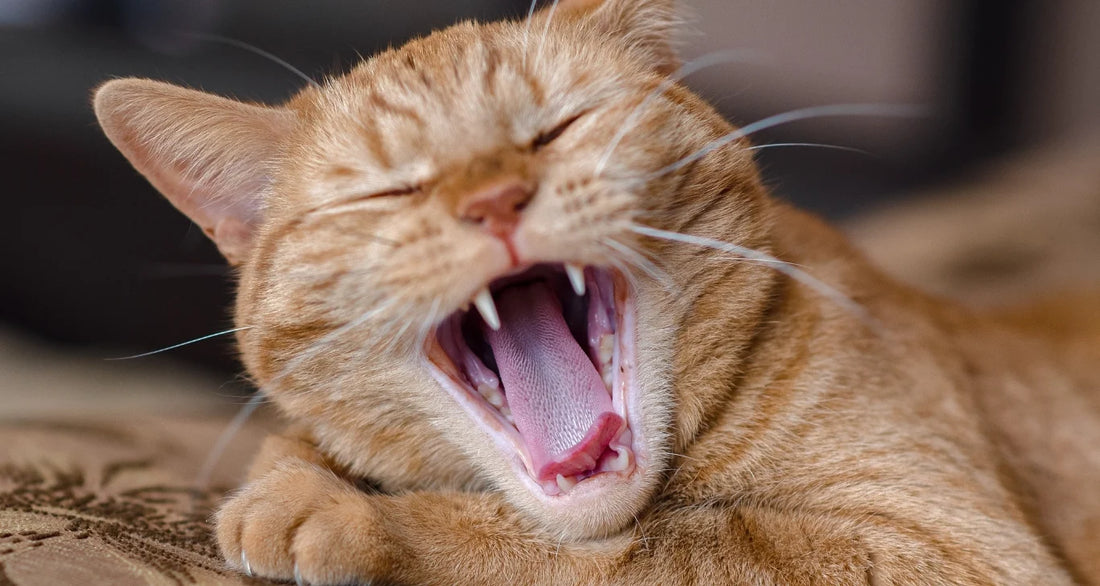Ensuring your pet's dental health is crucial for their overall well-being. Just like humans, pets can suffer from dental issues that, if left untreated, can lead to discomfort, pain, and more severe health problems. Establishing a regular dental care routine is key to preventing these issues and promoting a happy, healthy life for your furry friend. Read this article if you’d like to learn more about why you should care.
Starting a dental care routine may sound complicated but it doesn’t have to be!
If you have a young puppy or kitten..
Home oral care can be started as soon as your puppy/kitten develops permanent teeth. In fact, it is the perfect time to start a home dental care routine because starting early in a pet’s life can facilitate a smoother acceptance process.
- Consider starting with oral sprays as there is minimal direct contact with your pet's teeth and gums.
- Once they are used to that, try dental wipes which can gradually acclimate them to having their teeth and gums touched, paving the way for the eventual transition to regular toothbrushing.
- In the event that you are unable to advance to toothbrushing, supplementary products like water additives can be a beneficial addition.
If you have an adult dog or cat..
While you should ideally start your pet’s dental care routine from young, it is not too late to start one for your adult dog/cat.
The main goal of a dental care routine is to minimise and remove plaque to prevent the buildup of tartar.
Toothbrushing is the most effective way to maintain good dental hygiene as, according to a study, it decreases plaque by 37% if done daily, 25% if done every other day, and 10% if done weekly. The more often you brush your pet’s teeth, the more effective it is.
Use a pet-specific toothbrush and toothpaste to gently clean your pet's teeth. Introduce the brushing gradually, allowing your pet to get used to the sensation. Focus on the outer surfaces of the teeth, using small circular motions.
If you prefer not to brush everyday (it’s challenging, we know)..
It is fine as this is a case of ‘it’s better than nothing’, as long as you also combine the occasional toothbrushing with alternative products such as water additives on lazy/busy days (please don’t be lazy/busy everyday).
Water additives provide effectiveness with minimal effort, making it an easy habit to develop. It is also particularly useful after medical procedures when brushing isn’t possible.
“Wait, but I’m already feeding my pet dental chews/treats/diet regularly. Isn't that sufficient?”
Brushing daily has been proven to be three times more effective at controlling plaque than a daily dental chew/diet.
While dental chews/treats/diets are good at targeting teeth at the back, they tend to miss the front teeth. This is where sprays and wipes can be used to target front teeth, ensuring that all parts of the mouth are taken care of.
Other things you should do at home..
1. Monitor Diet and Nutrition
Your pet's diet plays a significant role in their dental health. Choose high-quality pet food that promotes dental care, such as formulations designed to reduce tartar and plaque. Some pet foods are specifically created to encourage chewing, which can help naturally clean your pet's teeth. Additionally, avoid feeding your pet human food that may contribute to dental problems.
2. Regularly inspect your pet's mouth
Check for signs of dental problems, such as red or swollen gums, discolored teeth, or unusual growths. Early detection can lead to more effective treatment.
Any on top of all that..
Routine dental check-ups with your vet is recommended at least every 6-12 months, depending on your pet (size, breed, existing dental issues), so it will be best to check with your vet. Just like how we visit the dentist, professional cleanings help to address any stubborn tartar or plaque that your home dental care routine may miss. Your vet can also identify and treat dental issues at an early stage, preventing them from escalating into more severe problems.
With these options, there shall be no more excuses to put off starting that dental routine. If you are intending to start one now, kudos to you for taking this first step! Be patient and gentle, and as it soon becomes a habit, you’d not only have one less thing to be stressed about but also a healthy, happy, nice-smelling pet to cuddle with.
Remember, a little effort in dental care goes a long way in keeping your pet's teeth and gums healthy for years to come.
TL;DR




